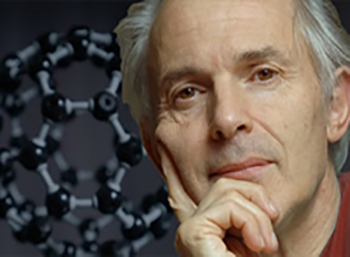
For Harold Kroto, very few, if any, professional accomplishments can top being chosen to receive a Nobel Prize for Chemistry, as he was in 1996. However, his latest honor, announced Tuesday, might come close.
Kroto, the Eppes Professor of Chemistry at Florida State University, has been elected as a foreign associate to the National Academy of Sciences—one of the highest honors that can be accorded a scientist or engineer.
Internationally known for his pioneering work in the fields of nanoscience and nanotechnology, Kroto is one of 72 new members and 18 foreign associates from 16 countries elected by the Academy this year in recognition of their distinguished and continuing achievements in original research.
"It is a great honor and I value it very much," Kroto said of his election to the Academy. "I did not realize (until now) how hard it is for scientists in the United States to become members of the National Academy of Sciences. I am particularly pleased for FSU’s department of chemistry and biochemistry, which is producing some of the finest research—and researchers—in the country. Hopefully my election to the Academy will bring more public attention to the fine work that is taking place here."
Joseph Travis, the dean of FSU’s College of Arts and Sciences, said the announcement is a testament to Kroto’s sterling reputation.
"It’s a great honor. Being elected to the National Academy of Sciences is a very difficult thing for an individual to achieve," he said. "Harry Kroto’s election reflects the deep respect that the scientific community has for his work and for him as a person."
Kroto is best known for his discovery, with colleagues Richard E. Smalley and Robert F. Curl Jr., of buckminsterfullerene, an unusual carbon molecule consisting of 60 carbon atoms arranged as a spheroid. Buckminsterfullerene, nicknamed "buckyballs," was found to be extraordinarily strong and light and to form superconductive compounds. Its discovery has opened up an entirely new branch of chemistry. As a result of their research, Kroto, Smalley and Curl were awarded the 1996 Nobel Prize for Chemistry.
An ardent advocate for science education, Kroto currently devotes some of his time and energy to promoting careers in science among young people around the world. Through the Vega Trust (www.vega.org.uk), which he co-founded in 1994, Kroto has created a broadcast platform for the science, engineering and technology communities, thus enabling them to communicate directly on their fields of expertise using TV and the Internet.
"It is an honor for FSU to have a person with Professor Kroto’s interests and leadership on our faculty," said Kirby Kemper, FSU’s vice president for Research. "Not only is he a tremendous chemist, but his worldwide work to develop students’ interests in pursuing an understanding of science has brought renewed vigor to FSU’s work in outreach to K-12 teachers and students. The FSU community thanks the department of chemistry and biochemistry for bringing Professor Kroto to our university."
Kroto, who joined the FSU faculty in 2004, becomes the 10th FSU faculty member to be elected to the National Academy of Sciences. The other current faculty members are Lev Gor’kov (2005), Melvin Stern (1998), Donald Caspar (1994), Michael Kasha (1971) and Robert Schrieffer (1971).
In addition to Kroto, two other scientists with FSU connections were elected to the Academy on Tuesday. Mark H. Thiemens received his doctorate in oceanography from FSU in 1977; he currently serves as dean of the Division of Physical Sciences at the University of California, San Diego. And David M. Karl, a professor of oceanography at the University of Hawaii at Manoa, earned his master’s degree in oceanography at FSU in 1974.
The National Academy of Sciences (www.nasonline.org) is a private organization of scientists and engineers dedicated to furthering science and its use for the general welfare.




